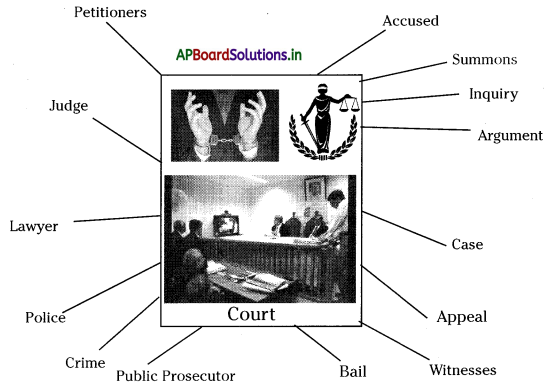Students can go through AP State Board 8th Class Social Studies Notes Chapter 15 Law and Justice: A Case Study to understand and remember the concept easily.
AP State Board Syllabus 8th Class Social Studies Notes Chapter 15 Law and Justice: A Case Study
→ If you have to make a complaint to the police, it is necessary to file an FIR at the police station.
→ A copy of the FIR should be given free of charge to the person making the report.
→ One important function of the police is to investigate any complaint about the crime.
→ It is not the job of the police to punish the accused.
→ Civil cases are related to people’s rights over land, property, income and people’s relationships with one another.
→ The police take charge of the criminal case because it is a violation of law made by the government.
→ Bail is a right of the accused.
→ A criminal offence is registered as a public wrong.
→ The judge is like an umpire in a game and conducts the trial impartially and in an open court.
→ One of the central features of the Constitution is to separate the powers of Executive, Judiciary and Legislative.
![]()
→ Each state has a High Court which is the highest court of that state.
→ Supreme Court is located in New Delhi.
→ Accused: The person who has done something wrong.
→ FIR: First Information Report gathered by the police.
→ Offence: A breach of law or rule; an illegal act.
→ Investigation: A formal inquiry or systematic study.
→ Arrest: To seize a person by legal authority or warrant.
→ Summons: An order to appear before a judge or magistrate.
→ Witness: One who furnishes evidence.
→ Fair Trial: A trial by a neutral and fair court.
→ Judgement: The legal document stating the reasons for a judicial decision.
![]()
→ Appeal: To make a serious or urgent request to the public.
→ Breach of contract: Failure to do something that is required in a contract.
→ Client: A person receiving social or medical services.
→ Public Prosecutor: A law officer who conducts criminal proceedings on behalf of the government or in the public interest.
→ Bail: The temporary release of an accused person awaiting trial.
![]()
→ ‘Magistrate: A civil officer or judge who administers the law, especially who conducts a court that deals with minor offences.
